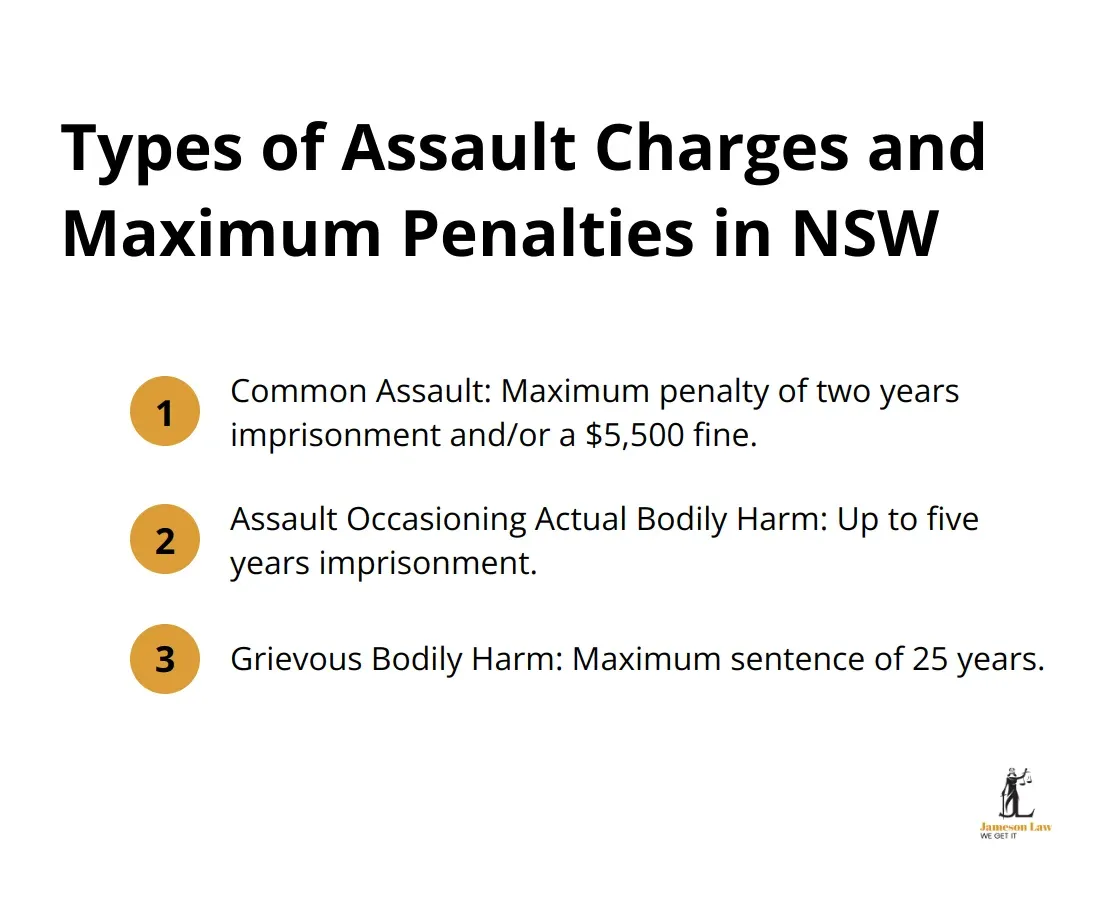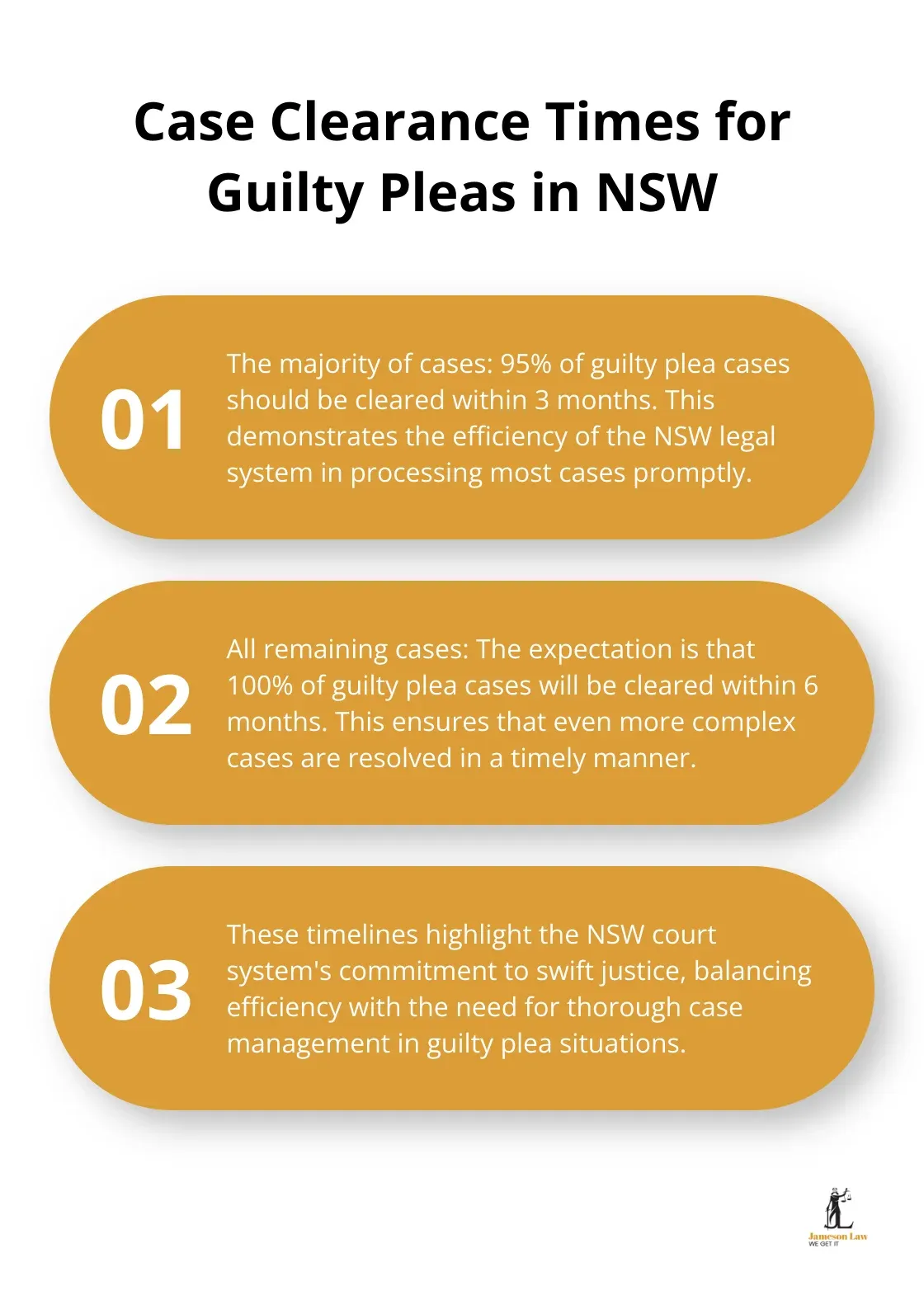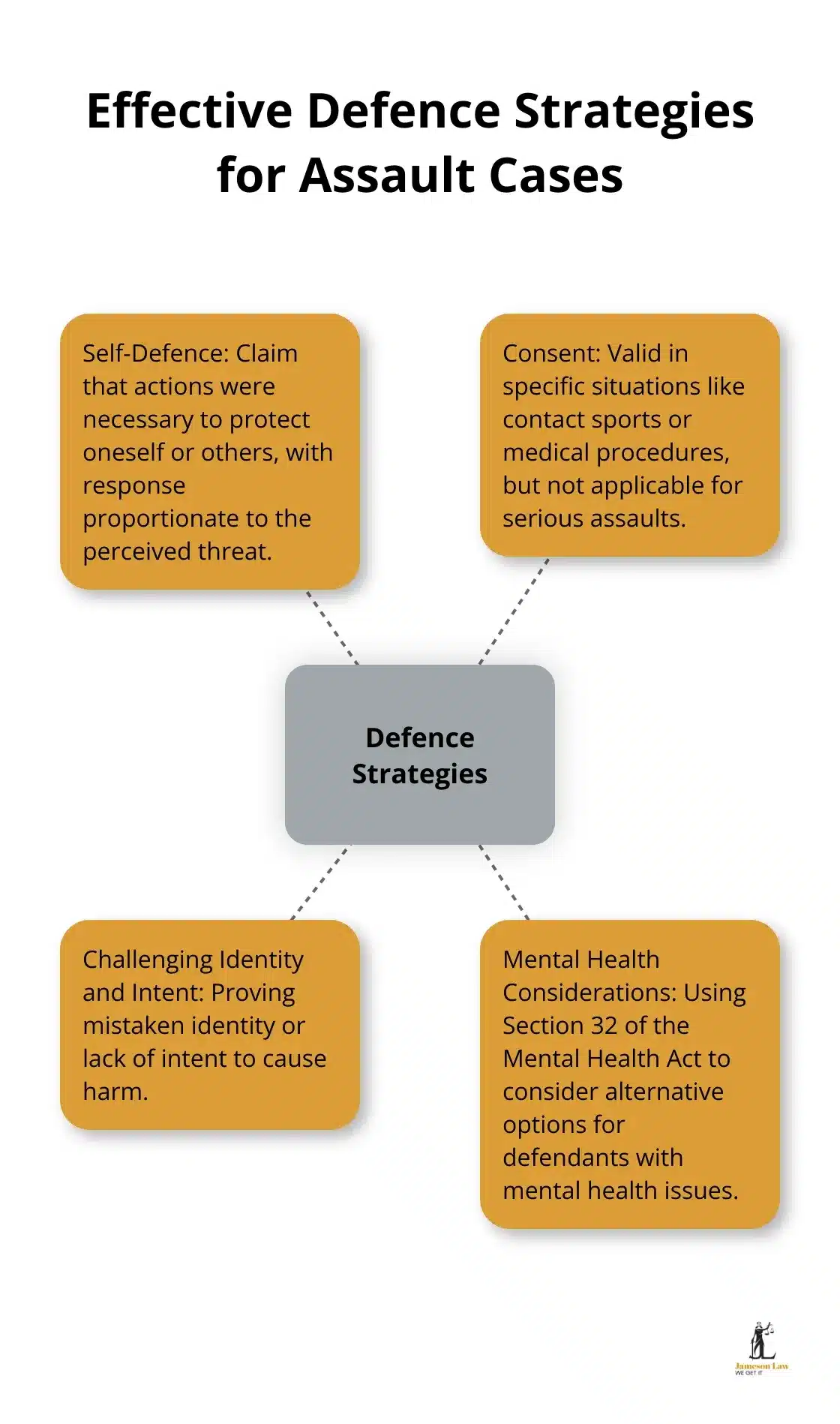Facing assault charges in NSW can be a daunting experience, with serious legal consequences on the line.
At Jameson Law, we understand the complexities of assault cases and the importance of protecting your rights throughout the legal process.
An experienced assault lawyer can make a significant difference in the outcome of your case, from providing expert advice to developing a robust defence strategy.
What Are Assault Charges in NSW?
Definition of Assault Under NSW Law
The Crimes Act 1900 (NSW) defines assault as being divided into two categories: common and aggravated assault. This definition encompasses a wide range of actions, from threatening gestures to physical contact. NSW law recognises that assault can occur even without physical contact, as long as the victim fears immediate unlawful violence.
Types of Assault Charges in NSW
NSW law categorises several types of assault charges, each carrying different penalties:
- Common Assault: The least severe form, involving actions that cause another person to fear immediate unlawful violence.
- Assault Occasioning Actual Bodily Harm: Results in injuries requiring medical attention.
- Grievous Bodily Harm: Involves permanent or serious disfigurement.
- Sexual Assault: Encompasses non-consensual sexual acts, ranging from indecent assault to aggravated sexual assault.
Penalties for Assault Convictions
The severity of penalties for assault convictions in NSW reflects the seriousness of the offence:

The NSW Bureau of Crime Statistics and Research reported an increase in violent offences from January 2020 to January 2024, including a 3% annual increase in assault.
Factors Influencing Sentencing
NSW courts consider various factors when determining sentences for assault convictions:
- Severity of the injury
- Presence of weapons
- Relationship between the offender and victim
- Prior criminal history
- Mitigating factors (e.g., remorse, good character, prospects for rehabilitation)
These factors can significantly impact case outcomes. Experienced assault lawyers work to present the most favourable case for their clients, ensuring all relevant mitigating factors receive consideration.
The Importance of Legal Representation
The complexity of assault charges in NSW and the potential for severe penalties make expert legal advice essential. Prompt action in seeking legal representation can make a substantial difference in the outcome of a case. A skilled assault lawyer can navigate the intricacies of NSW assault laws, provide guidance, and offer robust representation throughout the legal process.
As we move forward, we’ll explore the critical role an assault lawyer plays in protecting your rights and building a strong defence strategy.
How an Assault Lawyer Protects Your Rights
Comprehensive Case Analysis
An assault lawyer’s first step involves a thorough analysis of your case. This includes reviewing police reports, witness statements, and all available evidence. For example, our team once uncovered crucial CCTV footage that contradicted the prosecution’s narrative, which led to dropped charges for our client.
Strategic Defence Planning
After analysing the case, your lawyer will develop a tailored defence strategy. This strategy might challenge witness credibility, question the legality of evidence collection, or present alternative explanations for the alleged incident.
Skilled Negotiation
Experienced assault lawyers often negotiate with prosecutors to secure better outcomes for their clients. These negotiations can result in reduced charges, alternative sentencing options, or even case dismissals. When a defendant enters a guilty plea, 95 per cent of those cases should be cleared in 3 months and 100 per cent within 6 months.

Court Representation
If your case proceeds to trial, your assault lawyer will represent you in court. They will present your defence and cross-examine witnesses. Their expertise in courtroom procedures and legal arguments proves essential in ensuring the judge or jury hears your side of the story effectively.
Mitigating Penalties
Even in cases where a conviction seems likely, an assault lawyer works to mitigate penalties. This effort might involve presenting character references, demonstrating remorse, or highlighting factors that led to the incident. NSW courts consider various mitigating factors when sentencing, such as whether the injury suffered by the victim was not substantial, and a skilled lawyer can effectively present these to secure a more lenient outcome.
An assault lawyer’s role extends beyond legal representation. They provide emotional support, guide you through the complex legal system, and work tirelessly to protect your rights and future. With common assault potentially resulting in a maximum penalty of two years imprisonment, having a dedicated legal advocate can significantly impact your case’s outcome.
As we explore the common defence strategies used in assault cases, you’ll gain a deeper understanding of how an experienced lawyer can build a strong case in your favour.
Effective Defence Strategies for Assault Cases

The Power of Self-Defence Claims
Self-defence stands as a potent legal argument in assault cases. Section 418 of the Crimes Act 1900 (NSW) outlines when self-defence is available in New South Wales. Under that provision, the accused must have believed their actions necessary to defend themselves or others. The response, however, must be proportionate to the perceived threat.
A successful self-defence claim often hinges on presenting compelling evidence (such as CCTV footage or witness statements) that demonstrates the accused reasonably believed they were in danger and acted to protect themselves.
Consent as a Defence
In specific situations, consent can serve as a valid defence against assault charges. This defence applies particularly to cases involving contact sports or medical procedures. It’s important to note that consent cannot be used as a defence for more serious assaults resulting in grievous bodily harm.
Challenging Identity and Intent
Mistaken identity and lack of intent are two strategies that can significantly impact assault cases. In NSW, the prosecution must prove beyond reasonable doubt that the accused committed the assault and intended to do so.
Mistaken identity defences often involve meticulous examination of evidence (e.g., CCTV footage) and gathering of alibi evidence to prove the accused was not the perpetrator. Other defences may include insufficient evidence, illegal or improper police actions, or the potential absence of a witness in court.
Lack of intent can be a compelling defence, especially in cases of accidental contact. For example, accidentally bumping into someone in a crowded area, causing them to fall, likely doesn’t constitute intentional harm. This absence of intent can form a strong defence against assault charges.
Mental Health Considerations
Mental illness or cognitive impairment can play a significant role in assault cases. Section 32 of the Mental Health (Forensic Provisions) Act 1990 allows courts to consider alternative options for defendants with mental health issues. Criminal proceedings involving a client who is mentally or cognitively impaired can be challenging for all parties involved.
A successful mental health defence often involves presenting expert psychiatric testimony and a comprehensive treatment plan. This approach can lead to a dismissal of charges under Section 32, providing an alternative path to justice for those with mental health challenges.
Final Thoughts
Assault charges in NSW can alter your life significantly, with consequences extending beyond the courtroom. The complexities of assault laws and high stakes make professional legal representation essential. An experienced assault lawyer brings invaluable expertise to your case, from navigating the NSW legal system to developing robust defence strategies tailored to your unique situation.
We at Jameson Law understand the stress and uncertainty that come with assault charges. Our team of dedicated assault lawyers combines deep legal knowledge with a commitment to protect your rights at every stage of the legal process. We analyse your case, challenge evidence, negotiate with prosecutors, and represent you effectively in court.
If you face assault charges in NSW, act quickly. Exercise your right to remain silent and avoid discussing your case with anyone except your lawyer. Gather and preserve any evidence that might support your defence (including witness contact information and relevant documents). Contact a qualified assault lawyer immediately to start building your defence strategy.













